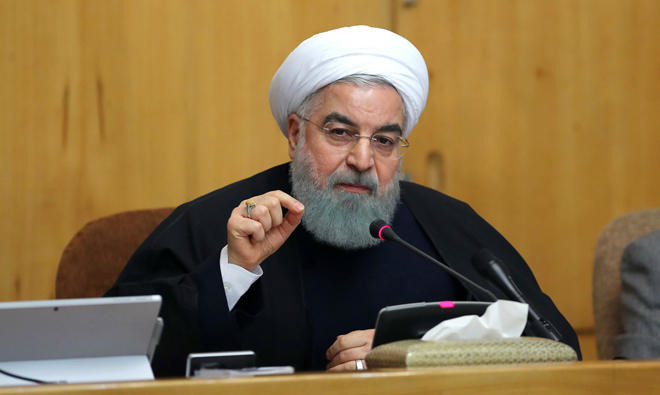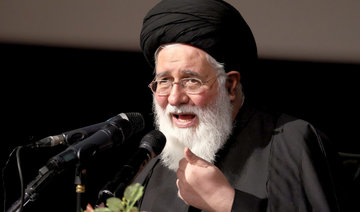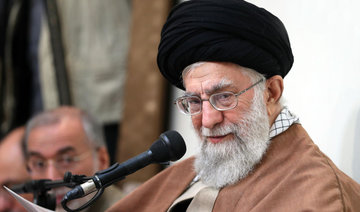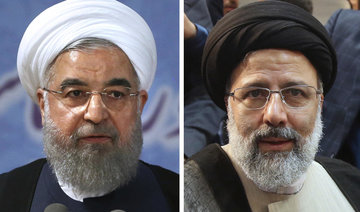DUBAI: Iranian authorities are concerned that nationwide unrest will undermine the clerical establishment and want to stamp out the protests quickly, senior regime officials say. But the person with the most to lose is President Hassan Rouhani.
While several senior officials said there was concern that prolonged unrest would damage the legitimacy and influence of the country’s religious leaders, few insiders see the unrest as an existential threat to that leadership, which has ruled since the 1979 revolution and is now controlled by Supreme Leader Ayatollah Ali Khamenei, the ultimate authority in Iran’s system of dual clerical and republican rule.
The biggest loser, they say, is likely to be Rouhani, who is much more closely tied to the country’s economic policies.
“Of course, Rouhani and his government will have less power afterward, especially because his economic policy was criticized during the unrest,” said political analyst Hamid Farahvashian.
“He will be a lame-duck president and Khamenei will have more power.”
Much of the protesters’ anger has focused on what Rouhani and his government have failed to deliver: An economic boom promised as the payoff for the 2015 deal that curbed Iran’s disputed nuclear program in return for world powers lifting sanctions.
Protesters are angry that Iran’s youth unemployment rate is edging toward 30 percent, want higher wages and an end to alleged graft. They have chanted slogans against all of Iran’s leaders, including the clerical elite, and attacked police vehicles, banks and mosques as the unrest widened.
“The continuation of the protests will lead to a legitimacy crisis,” said one senior official close to Rouhani, asking not to be named due to the sensitivity of the issue.
“People have economic demands... of course these demands should be taken seriously... of course the establishment should listen to the people, but all these can be discussed in a calm atmosphere,” the official said.
Some conservatives have pushed for a hard-line approach, even though bloodshed could fuel more protests in the largest wave of demonstrations since nationwide unrest in 2009.
“So far, security forces have not tried to prevent the demonstrations... but this will change if (Khamenei) calls for an end to the street protests and demonstrators defy his call,” said one former Iranian official from the reformist camp.
Even if the unrest is quelled, the demands of tens of thousands of restless working-class youths who have taken to the streets are unlikely to dissipate.
Khamenei spoke publicly for the first time about the crisis on Tuesday, accusing Iran’s enemies of stirring unrest but saying no more. A statement on his website said he would address the nation about the events “when the time is right.”
The protesters have little chance of toppling the clerical leaders, who appear to be retaining control of the military, police, and security forces and have no compunction about using them, according to one US official following the developments.
Rouhani, who was elected in 2013, is more exposed. He is seen as a pragmatist at odds with Iran’s hard-liners and has said in response to the protests that Iranians have a right to criticize the authorities.
But he has a fight on his hands because of growing resentment over high prices and allegations of corruption.
“His power is limited in Iran’s ruling system. Public discontent is increasing ... people are losing their faith in the establishment system,” a third Iranian official said. “The leaders are well aware of this fact and its dangerous consequences.”
US officials fear the likeliest outcome of the protests is discrediting what one called Rouhani’s “moderate brand of moderation” and a harsher crackdown by the clerical authorities.
“It’s an open question whether Rouhani ever intended to keep any of his promises, but he hasn’t delivered, especially on the economic front, and that means he has no popular support and is expendable to Khamenei,” said a second US official, who spoke on condition of anonymity to discuss intelligence matters.
“He’s likely to be one of the casualties, though maybe not immediately.”
Rouhani has blamed his predecessor and the US, Iran’s long-time adversary, for the economy’s shortcomings.
But his government has also backtracked on planned fuel price rises and promised more jobs.
Rouhani may need to spend more money to create more employment if he is to ease discontent and could risk antagonizing powerful interests if he tries to address allegations of corruption.
His vulnerability and the deep divisions in Iran’s hierarchy have fueled suspicions among some of his sympathizers that conservative rivals may have played a hand in the crisis.
“It was a coup against Rouhani and his achievements ... The aim was to harm Rouhani,” said Saeed Leylaz, a political analyst close to the pro-reform movement.
But a fourth official in Tehran said the nationwide protests had united Iran’s leadership.
“At this point, it is not important whether a political faction initiated the unrest to harm the rival group,” the official said. “The unrest was hijacked by our enemies ... that is why all factions have united to protect the Islamic Republic.”
Iran protests could hurt clerics but Rouhani has most to lose, say insiders
Iran protests could hurt clerics but Rouhani has most to lose, say insiders

Why Turkiye is so influential in post-Assad Syria

- Syria’s de facto leader, Ahmed Al-Sharaa, who heads HTS, has said he does not want Syria becoming a platform for the PKK to launch attacks against Turkiye
ANKARA: Turkiye has emerged as one of the most influential power brokers in Syria after rebels toppled Bashar Assad last month, ending his family’s brutal five-decade rule.
NATO member Turkiye is now in a position to influence its neighbor’s future diplomatically, economically and militarily.
Here are details of Turkiye’s connections with Syria and how it hopes to use its influence there.
WHY IS TURKEY IMPORTANT?
Turkiye, which shares a 911 km (566-mile) border with Syria, was the main backer of rebel groups fighting under the banner of the Syrian National Army during the 13-year uprising against Assad. It cut diplomatic ties with Damascus in 2012.
It is the biggest host of Syrians who fled the civil war, taking in some 3 million people, and is the main entry-point for aid.
Since 2016, Turkiye, with its Syrian allies, has mounted several cross-border military campaigns against Kurdish militants based in Syria’s northeast that it sees as a threat to its national security.
Syria’s new administration, led by Hayat Tahrir Al-Sham (HTS), a former Al-Qaeda affiliate, is friendly toward Ankara.
WHAT DOES TURKEY WANT?
With its strong ties to Syria’s new leadership, Turkiye stands to benefit from intensified trade and cooperation in areas including reconstruction, energy and defense.
Assad’s fall has presented Ankara with a window of opportunity to try to end the presence of the Kurdish People’s Protection Units (YPG) along its borders.
Ankara views the YPG as an extension of the Kurdistan Workers Party (PKK), which has been waging an insurgency against the Turkish state since 1984 and is deemed a terrorist group by Turkiye, the United States and the European Union.
The YPG militia spearheads the Syrian Democratic Forces (SDF) alliance, which is the United States’ main local partner in the fight against Daesh and controls swathes of territory in the northeast.
Washington’s longtime support of the Kurdish factions has been a source of tension with Ankara, but Turkish Foreign Minister Hakan Fidan has said he believes incoming US president Donald Trump will take a different approach.
Trump has not said publicly what his plans might be but has said that he thinks “Turkiye is going to hold the key to Syria.”
Syria’s de facto leader, Ahmed Al-Sharaa, who heads HTS, has said he does not want Syria becoming a platform for the PKK to launch attacks against Turkiye.
As rebels led by Sharaa took control of Damascus last month, fighting flared between Turkish-backed and Kurdish-led forces in the northeast.
The SDF has shown flexibility regarding some of Turkiye’s demands, telling Reuters last month that its foreign fighters, including PKK members, would leave Syria if Ankara agrees to a ceasefire.
Intensive talks are underway to try to resolve the conflict in the region.
WHAT HAS TURKEY SAID AND DONE?
Turkiye’s intelligence chief, Ibrahim Kalin, was in Damascus days after Assad was ousted, and its top diplomat, Fidan, was the first foreign minister to visit. Turkiye was also the first nation to reopen its embassy.
Fidan has said that Turkiye is proud to have been “on the right side of history” in Syria but has no desire to “dominate” it.
Turkiye has promised to support Syria’s reconstruction, offering to help rebuild infrastructure, draft a new constitution, supply electricity and resume flights.
It hopes Syrians it is hosting will start returning home but has said it will not force them to leave.
Turkiye has also called repeatedly for the YPG to be disbanded, while warning of a new military offensive if authorities in Damascus do not address the issue. Its officials have met repeatedly with US and Syrian counterparts about the issue.
The SDF has said it would be willing to integrate with Syria’s defense ministry, but only as “a military bloc.”
Kuwaiti charity dispatches 10 relief shipments to Syria

- The aid relief convoy departed on Sunday from Turkiye
LONDON: The Kuwaiti Al-Khair humanitarian society is sending 250 tons of aid relief to Syria as part of a campaign launched by the country's Ministries of Foreign Affairs and Social Affairs.
Al-Khair's chief Abdulrahman Al-Jerman said that 10 relief shipments departed on Sunday from Turkiye to Syria carrying foodstuff, aid, mattresses, and covers to support the Syrian people.
He urged everyone interested in donating to visit the society's headquarters or website, the Kuwait News Agency reported.
Four Moroccan truck drivers disappear on Burkina-Niger border

- The Moroccan diplomatic source said the embassy was working together with Burkina Faso authorities to find the drivers
- El Hachmi urged more protection in areas of high risk as the number of Moroccan trucks crossing the Sahel continues to rise
RABAT: Four Moroccan truck drivers went missing on Saturday as they crossed the restive border area between Burkina Faso and Niger, according to a source from the Moroccan embassy in Burkina Faso and a Moroccan transport union.
Three trucks, one carrying a spare driver, disappeared as they drove without an escort from Dori in Burkina Faso to Tera in Niger, an area known for terrorists threats, the diplomatic source said.
Junta-led Burkina Faso and Niger are battling militant groups linked to Al-Qaeda and Daesh, whose insurgencies have destabilized Sahel states in West Africa over the past decade.
The Moroccan diplomatic source said the embassy was working together with Burkina Faso authorities to find the drivers.
Authorities in Burkina Faso have been organizing security convoys to escort trucks in the border area to protect against militant attacks, the source said.
The trucks set off after waiting for a week without getting an escort, Echarki El Hachmi, Secretary General of Morocco’s transporters’ union, told Reuters.
The trucks, loaded with infrastructure equipment, departed weeks ago from Casablanca heading to Niger, he said.
El Hachmi urged more protection in areas of high risk as the number of Moroccan trucks crossing the Sahel continues to rise.
Earlier this month, a convoy of Moroccan trucks was attacked on the Malian border with Mauritania, although there were no casualties, El Hachmi said.
President of Iraq’s Kurdistan government meets Jordanian king, UAE president

- Masrour Barzani visited Amman and Abu Dhabi to discuss developments in the Middle East
LONDON: King Abdullah II of Jordan received Masrour Barzani, the president of the Kurdistan Regional Government of Iraq, at Basman Palace in Amman on Sunday.
They discussed current regional developments, particularly in the Gaza Strip and Syria, and the prospects for cooperation between Jordan and the Kurdistan Region to develop their ties.
Barzani acknowledged King Abdullah’s leadership in Jordan’s efforts for peace and stability in the Middle East, the Petra agency reported.
On Sunday, the Kurdish leader met with UAE President Sheikh Mohamed bin Zayed Al-Nahyan at Qasr Al-Shati in Abu Dhabi to discuss ways to enhance cooperation between the two nations, according to the Emirates News Agency.
Sheikh Hamdan bin Mohamed bin Zayed Al-Nahyan, deputy chairman of the Presidential Court for Special Affairs, and Sheikh Khalifa bin Tahnoon bin Mohammed Al-Nahyan, chairman of the Abu Dhabi crown prince’s court, attended the meeting along with several other sheikhs, ministers, and senior officials.
Negotiators zero in on potential deal to disarm Syria’s last battleground

- In Ankara on Wednesday, Syrian Foreign Minister Asaad Hassan Al-Shibani said the extensive US-backed SDF presence was no longer justified, and the new administration would not allow Syrian land to be a source of threats to Turkiye
ISTANBUL/DAMASCUS: Negotiators are zeroing in on a potential deal to resolve one of the most explosive questions looming over Syria’s future: the fate of Kurdish forces that the US considers key allies against Daesh but neighboring Turkiye regards as a national security threat.
Diplomatic and military negotiators from the United States, Turkiye, Syria and the Kurdish-led Syrian Democratic Forces (SDF) are showing more flexibility and patience than their public statements suggest, a dozen sources told Reuters, including five directly involved in the intensive web of discussions in recent weeks.
This could set the stage for an accord in the coming months that would see some Kurdish fighters leave Syria’s restive northeast and others brought under the authority of the new defense ministry, six of the sources said.
However, many thorny issues need to be resolved, they said. These include how to integrate the SDF alliance’s well-armed and trained fighters into Syria’s security framework and administer territory under their control, which includes key oil and wheat fields.
In an interview with Saudi Arabia’s Asharq News channel on Tuesday, SDF commander Mazloum Abdi said the alliance’s “basic demand” is for decentralized administration — a potential challenge to Syria’s new leadership, which wants to bring all of the country back under the government’s authority after ousting Bashar Assad last month.
Abdi indicated that the SDF has no intention of dissolving, saying it was open to linking with the defense ministry and operating according to its rules, but as “a military bloc.”
Syria’s new defense minister, Murhaf Abu Qasra, rejected that approach in an interview with Reuters on Sunday, saying the suggestion that the SDF remain one bloc “is not right.”
The former rebels now in power in Damascus have said they want all armed groups to integrate into Syria’s official forces, under a unified command. The SDF, when asked for comment, referred Reuters to its commander’s interview.
How much autonomy Kurdish factions retain likely hinges on whether incoming US president Donald Trump continues Washington’s longtime support of its Kurdish allies, according to diplomats and officials on all sides.
Trump has not spoken publicly about his intentions, including his plans for some 2,000 US troops stationed in Syria. A Trump representative did not comment.
Any deal also depends on whether Turkish President Tayyip Erdogan holds off on a threatened military offensive against the People’s Protection Units (YPG), the Kurdish militia that spearheads the SDF alliance.
Ankara views them as an extension of the Kurdistan Workers Party (PKK), which has been waging an insurgency against the Turkish state since 1984 and is deemed a terrorist group by both Turkiye and the US
Turkish Foreign Minister Hakan Fidan said this month that Syria’s new authorities “should be given an opportunity to ... end the occupation and terror the YPG created,” but he did not say how long Ankara would wait for it to disarm before launching an incursion.
A Turkish Foreign Ministry source said disarming armed groups and the departure of “foreign terrorist fighters” were essential for Syria’s stability and territorial integrity, so the sooner this happens the better.
“We are voicing this expectation of ours in the strongest terms during our contacts with both the United States and the new administration in Damascus,” the source said.
INTENSIVE TALKS
US and Turkish officials have been holding “very intensive” discussions since rebels led by Hayat Tahrir Al-Sham (HTS), a former Al-Qaeda affiliate, launched a lightning offensive from their northwestern stronghold that deposed Assad on Dec. 8, a senior US diplomat told Reuters.
The two countries share a “common view of where things should end up,” including a belief that all foreign fighters should exit Syrian territory, the diplomat said, noting Turkish negotiators “have a very high sense of urgency” to settle things.
However, the diplomat, who like some other sources requested anonymity to discuss sensitive negotiations, said the talks were “hugely complex” and would take time.
Parallel talks are taking place between the US and both the SDF and HTS, Turkiye and HTS, and the SDF and HTS, officials from all sides say.
Part of a stateless ethnic group straddling Iraq, Iran, Turkiye, Armenia and Syria, Kurds had been among the few winners of the Syrian conflict, gaining control over Arab-majority areas as the US partnered with them in the campaign against Daesh. They now hold nearly a quarter of the country.
But Assad’s fall has left Syrian Kurdish factions on the back foot, with Turkiye-backed armed groups gaining ground in the northeast and the country’s new rulers in Damascus friendly with Ankara.
Turkiye, which provided direct support to some rebel groups against Assad, has emerged as one of the most influential power brokers in Syria since his fall. Like the US, it has designated HTS a terrorist group because of its Al-Qaeda past, but Ankara is believed to have significant sway over the group.
Officials on all sides worry that failure to reach a ceasefire and longer-term political accord in the northeast could destabilize Syria as it seeks to recover from a 13-year civil war that killed hundreds of thousands, displaced millions and drew in countries including Russia, Iran and Israel.
Dozens of people in northern Syria have been reported killed since December in clashes between the Kurdish-led SDF and Turkiye’s allies, and in cross-border Turkish airstrikes.
Failure to resolve the fate of Kurdish factions in Syria could also undermine nascent efforts to end the PKK’s insurgency in Turkiye.
The United Nations has warned of “dramatic consequences” for Syria and the region if a political solution is not found in the northeast.
POTENTIAL TRADE-OFFS
US support for the SDF has been a source of tension with its NATO ally, Turkiye.
Washington views the SDF as a key partner in countering Daesh, which Secretary of State Antony Blinken has warned will try to use this period to re-establish capabilities in Syria. The SDF is still guarding tens of thousands of detainees linked to the group.
Erdogan said on Wednesday that Turkiye has the power to “crush” all terrorists in Syria, including Daesh and Kurdish militants.
Turkiye wants the management of camps and prisons where Daesh detainees are being held transferred to Syria’s new rulers and has offered to help them. It has also demanded that the SDF expel all foreign fighters and senior PKK members from its territory and disarm the remaining members in a way it can verify.
Abdi, the SDF commander, has shown flexibility regarding some Turkish demands, telling Reuters last month that its foreign fighters, including PKK members, would leave Syria if Turkiye agrees to a ceasefire.
The PKK said in a statement to Reuters on Thursday that it would agree to leave if the SDF maintains control of the northeast or a significant role in joint leadership.
Such assurances are unlikely to satisfy Ankara at a time when the SDF is “trying to stay alive and autonomous” in Syria, Omer Onhon, Turkiye’s last ambassador to Damascus, told Reuters.
In Ankara on Wednesday, Syrian Foreign Minister Asaad Hassan Al-Shibani said the extensive US-backed SDF presence was no longer justified, and the new administration would not allow Syrian land to be a source of threats to Turkiye. Standing next to him, his Turkish counterpart, Fidan, said it was time to put anti-terror pledges into practice.
Abdi told Asharq News that he has met with Syria’s de facto leader, Ahmed Al-Sharaa, and the two sides agreed to set up a joint military committee to decide how the SDF would integrate with the defense ministry. He described the meeting with Sharaa, who heads HTS, as positive.
Abu Qasra, the defense minister, accused SDF leaders on Sunday of “procrastinating” on the issue, saying “consolidation of all areas under the new administration ... is a right of the Syrian state.”
The new leadership believes that allowing SDF fighters to continue operating as a bloc would “risk destabilization, including a coup,” a ministry official told Reuters.
Abdi argued that a decentralized administration would not threaten Syria’s unity, saying the SDF is not demanding the kind of federalism introduced in Iraq, where Kurds have their own regional government.
Some Syrian officials and diplomats say the SDF will likely need to relinquish control of significant territory and oil revenues, gained during the war, as part of any political settlement.
In return, Kurdish factions could be granted protections for their language and culture within a decentralized political structure, said Bassam Al-Kuwatli, president of the small Syrian Liberal Party, which supports minority rights but is not involved in the talks.
A senior Syrian Kurdish source acknowledged that some such trade-offs would likely be needed but did not elaborate.
Abdi told Asharq News that the SDF was open to handing over responsibility for oil resources to the new administration, provided the wealth was distributed fairly to all provinces.
Washington has called for a “managed transition” of the SDF’s role.
The US diplomat said Assad’s ouster opens the door for Washington to eventually consider withdrawing its troops from Syria, though much depends on whether trusted forces like its Kurdish allies remain engaged in efforts to counter any Daesh resurgence.
Trump’s return to the White House on Monday has raised hopes in Turkiye of a favorable deal, given the rapport he established with Erdogan during his first term.
Trump has spoken approvingly about Erdogan’s role in Syria, calling him a “very smart guy,” and said Turkiye would “hold the key” to what happens there.
“The Americans won’t abandon (the SDF),” said Onhon, Turkiye’s former ambassador. “But the arrival of someone as unpredictable as Trump must worry them in a way too.”






















